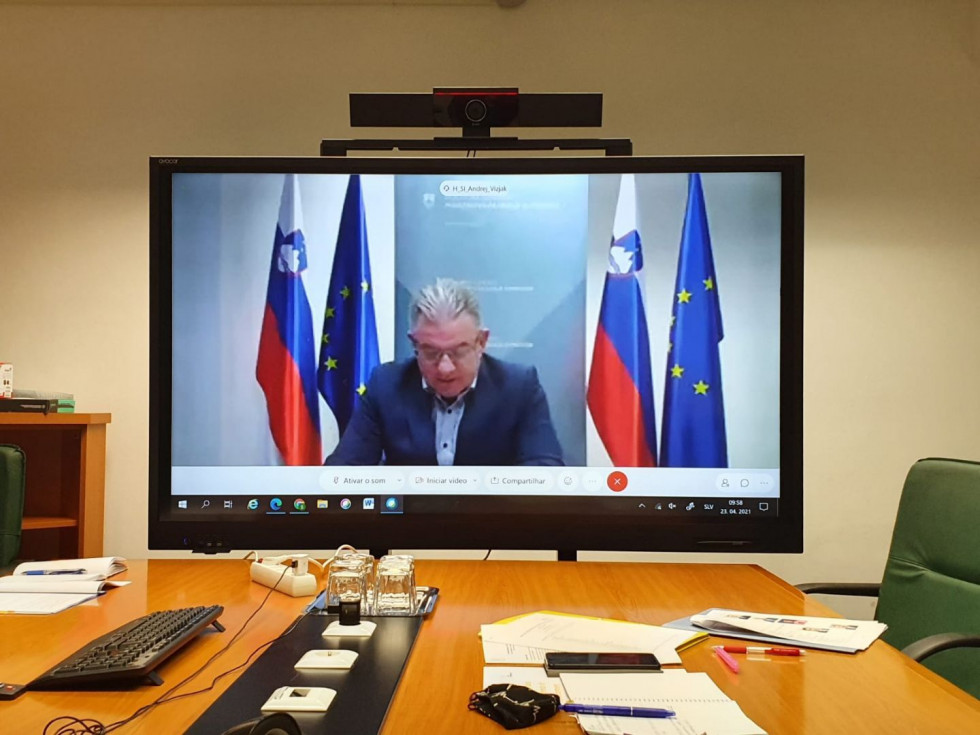By: UKOM
The Minister of the Environment and Spatial Planning, Andrej Vizjak, attended the informal videoconference of the EU environment ministers under the Portuguese presidency of the Council of the EU. The ministers discussed the challenges related to water management in the light of adaptation to climate change. The meeting focused on exchanging good practices and experience in tackling the challenges of water scarcity and droughts, and on improving water management at all levels.
The ministers also discussed the international aspect of adaptation in the light of preparations for the November climate conference in Glasgow. Recently achieved agreement with European parliament on European Climate Law presents a positive signal for raising international ambition at COP26. Minister Vizjak congratulated Portuguese presidency for their hard work.
Ministers discused the challenges related to priority measures in addressing water aspects within the new EU strategy on adaptation to climate change. In this regard the importance of cross-sectoral coordination and participation of stakeholders was highlighted. The Portuguese Presidency also stipulated the debate on good practices of the Member States, and their experiences in addressing these challenges. The importance of action at local level and cooperation with other stakeholders, in particular the involvement of civil society and the private sector was emphasised. Scien based decisions and digital solutions (better and faster processing and exchange of weather data), should be taken into account when introducing measures. The importance of nature-based solutions was also highlited.
In the afternoon, special attention was paid to the risk of droughts and water scarcity, as the consequences of climate change are often connected to water, (intense precipitation, floods, droughts). Adaptation strategies and plans need to be improved and upgraded in order to tackle this issue.
Minister Andrej Vizjak pointed out that the planned measures from the new EU strategy constitute the basis for further action in water management. The existing Water Framework Directive has significantly contributed to the improvement of water management and the protection of water sources in the EU. “Adherence to the principles of the EU Water Framework Directive is crucial for ensuring the sustainable management of water resources and reducing their consumption,” stressed Minister Vizjak.
The quality of water in Slovenia is relatively high. Slovenia is abundant with groundwater sources providing 97% of the supply of drinking water and also being a significant source of mineral in thermal waters. That is why we must strive for sustainable water and water land management. Nevertheless, various actions are being taken to adapt to climate change as regards water, by introducing sustainable flood protection schemes and developing methods to cope with drought. In the recent years, various stakeholders have been included in the processes of building resilience. Slovenia is also active in the framework of cross-border cooperation at a bilateral level and in the broader region.
Minister Andrej Vizjak stressed Revovery and Resilience plan we envisaged flood measures as an important part of our activities for efficient water management and climate adaptation. Stresses also that we have, since 2018, a flood warning and forecasting system in the Sava River Basin has been established, based at the Environmental Agency of the Republic of Slovenia in Ljubljana.
“Since 2006, Slovenia has hosted the Drought Management Centre in Southeast Europe – DMCSEE, which provides support in the development and use of tools for managing the effects of drought and making of appropriate policies,” said Minister Andrej Vizjak.
The ministers also paid considerable attention to the international aspect of the EU’s climate change adaptation strategy, which is particularly important in the light of the preparations for the COP26 climate conference in Glasgow. The EU should continue to form strong alliances with key developing countries and promote international actions. “This is why we support enhanced international cooperation with the most vulnerable countries, as well as the planned activities within the Green Agenda in the Western Balkans,” said Minister Andrej Vizjak.
Source: gov.si

